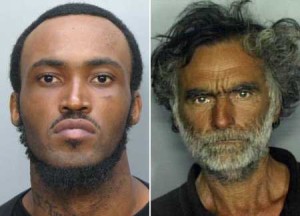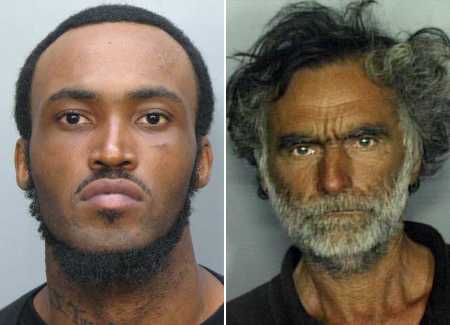Tag Archives: miami dade county
Troubled lives clashed in ‘Miami zombie’ face-eating attack
 MIAMI — Saturday’s horror-movie episode on Miami’s MacArthur Causeway brought together two troubled men, one who was struggling to get his life on track, another who’d given up trying.
MIAMI — Saturday’s horror-movie episode on Miami’s MacArthur Causeway brought together two troubled men, one who was struggling to get his life on track, another who’d given up trying.
Rudy Eugene, 31, had been seeking spiritual guidance in Scripture. On May 24, two days before he would viciously attack a homeless man named Ronald Edward Poppo, Eugene attended a Bible-study session at a friend’s North Miami Beach home.
Recently, Eugene posted a verse from Psalm 59 on his Facebook page: “Deliver me from my enemies, O my Lord; Defend me from those who rise up against me. For the Lord God is my defense. …”
Friend Bobby Chery said he, Eugene and another friend discussed that day what they could do to become better men according to the word of God, and that Eugene vowed to give up marijuana.
That same Thursday, Miami Police rousted Poppo from one of the last places he called home: the top floor of the parking garage at Jungle Island, the Watson Island botanical and wildlife attraction.
Outreach workers from the Miami Homeless Assistance Program found him there and offered help, said Ronald Book, chairman of the Miami-Dade County Homeless Trust.
But after Poppo became “belligerent and aggressive,” the outreach team called police. Officers issued Poppo, who had turned 65 a week earlier, a “trespassing after warning” citation.
“He grabbed his box of stuff and went off,” said Book. Outreach workers reported he was “cursing and claiming discrimination.”
About 2 p.m. on Saturday, a naked Rudy Eugene grabbed Poppo near the causeway’s west end, stripped off his clothes, beat him, bit him, and gnawed off his face.
More than 15 minutes into the attack, a police officer arrived and shot Eugene to death. Poppo remains in critical condition at Jackson Memorial Hospital’s Ryder Trauma Center.
The crazed assault shocked nearly everyone who knew Eugene.
Johansen Aurelus, a childhood friend, called Eugene “preacher” because he liked sharing Bible verses with friends and kept his Bible handy.
Aurelus attended Bethel Baptist Church with Eugene when they were teens. Back then, Aurelus said, Eugene would ask questions about the pastor’s sermons and how they applied to his life.
Over the years Rudy had some run-ins with the police for marijuana possession and a domestic dispute. Most recently, he had difficulty holding a job, friends say.
Eugene’s stepfather, Melimon Charles, of North Miami, said that Eugene “is not the kind of devil who goes out and kill people like they are showing on the news. He’s a fine boy. He was raised in the church. He was in the choir.”
Trouble may have started about the time Eugene learned Melimon was not his biological father, in ninth or tenth grade, although Melimon had been with Eugene’s mom Ruth since the boy was 2.
Rudy “was angry because he was looking for his father,” Charles said. “His father passed away and he didn’t know. And I didn’t know anything about it. I didn’t even have a picture to show him.”
Soon after, he said, Eugene accepted “the truth and we were doing fine.”
But at 17, Eugene moved out of his home, without telling his stepfather. He transferred from North Miami Beach High School to North Miami High.
If he was upset over “family issues,” it was because of his parents’ divorce, which happened after he was an adult, Charles said.
Charles dismisses gossip that Rudy was the target of a voodoo curse.
“Nobody went to Haiti and did anything to him,” he insisted.
Though Eugene had stopped attending church regularly, he maintained his quest for spirituality. He regularly sent inspirational text messages to his friends. And on Facebook, he mentions “Zoe Life” several times — a phrase both associated with Haitian life and with born-again Christians.
His final post, on May 18, proclaimed: “ZOE LIFE IS ETERNAL!!!!!!!!!”
Friends posted tributes on his page.
“Damn, I still can’t believe it, out of all people, YOU! You have been a great friend to me, and for that you will always be missed!” said Meli Mel Rivera.
Ranessia Rollins posted that Eugene was at her house on Friday and kissed her cheek.
All of his friends expressed disbelief and solidarity.
Pudding Sabali said: “They’re telling me (us) that we shouldn’t have any grief for you dying. But it’s hard to not have the deepest warm feeling when it comes to you … just a young man misunderstood … God have mercy on your soul.”
Understanding Ronald Poppo is harder because he lived anonymously for so long.
Ron Book said that outreach workers had been offering him services since Dec. 27, 1999. At the time, he said he hadn’t lived at a permanent address since 1970.
Poppo said he’d become homeless outside of Florida, slept on Watson Island and abused alcohol.
He stayed in an emergency shelter for 141 days, during which he saw a counselor once, according to assistance program records.
Four years later, Miami police took him back to the shelter. Starting on Oct. 6, 2003, Poppo stayed for 10 days, and again met once with a counselor.
Between that stay and his last encounter with outreach workers on May 24th, Poppo may have spent less than a week living inside.
Records show he stayed twice at Camillus House in 2004, on Jan. 26 and July 20, and once at the Homeless Assistance Center on Nov. 16. His last stay: Jan. 23, 2005, under a cold weather sheltering program.
On Nov. 11, 2004, some kind of “mental crisis” brought him to Jackson’s crisis intervention unit, but an assistance program report is unclear about whether he stayed overnight.
Outreach teams approached him three times in 2005 and 2006, but he refused help.
“During one of the contacts he became angry and started throwing rocks at the outreach staff,” Book said.
Among Miami’s 240 to 260 chronic homeless people, “sometimes after three, 10, 30 attempts, we get a guy or woman to come in,” Book said. “There are people for different reasons, it takes them that long, maybe never, to get off the streets.”
Details of Poppo’s life have been surfacing in bits since the assault. The 1964 graduate of New York’s elite Stuyvesant High School grew up in Brooklyn, according to long-lost sister Antoinette Poppo.
Neither she nor Poppo’s two brothers have seen him in more than 30 years, she said, and none of them plan a trip to Miami. Two siblings live in New York, another in California.
Their late father was a shipfitter, she said, a structural worker in a shipyard. She believes that “Ronnie” attended both parents’ funerals.
She couldn’t explain the conditions that led to her brother’s downward spiral and his estrangement from the family.
“I’m 12 years older,” she said. “He was 6 years old when I got married and left the house.”
But she called him “a very intelligent boy and a gentle person.”
For a time in the late ’80s, Poppo worked as a roadie for the band SKUM, which spent about two years in Miami before breaking up around 1990.
They’re reuniting for a documentary, said former lead singer Hart Baur, of Miami. He said that part of the band’s philosophy was to hire homeless guys to carry equipment.
In an email from North Carolina, former bass player Patrick Burke, a former Miamian, said band members would see “homeless guys panhandling, so we’d take them to Burger King, and say, ‘You want to work, take out the garbage and sweep up the parking lot?’ ”
They’d give them a few bucks, booze and dinner.
There were moments of lucidity with Poppo, whom he called Ernie, “because I thought he looked like Ernest Hemingway,” Burke said.
Other band members called him Pops, Burke said, because he looked old.
Poppo was hanging out “under a bridge off Biscayne Boulevard” when the band met him, Burke said. “He loved to drink and we used to always kid him about the fact that homeless people always had the best heads of hair. Pops used to say, “It’s just the lifestyle, man — no bad chemicals on my head.”‘
He was always wearing a Yankee cap, Burke said, “and he would take it off to show his locks to the girls at our shows. … Last time I saw him was at the Grove Cinema in 1989.”
On Thursday, the Jackson Memorial Foundation established a fund for Poppo’s care. Foundation spokesman Larry Clark said that “inquiries have come from all over the country.”
Donations can be made on the foundation’s website, www.jmf.org (click the “Take Action Now” tab, and then click on donations. On the donation page, select “other” in the Contribution Details section and write in “Ronald Poppo”).
Donations by check should be sent to Jackson Memorial Foundation, Park Plaza East, Suite G, 901 N.W. 17th Street, Miami, FL 33136.; write “Ronald Poppo” on the memo line.
